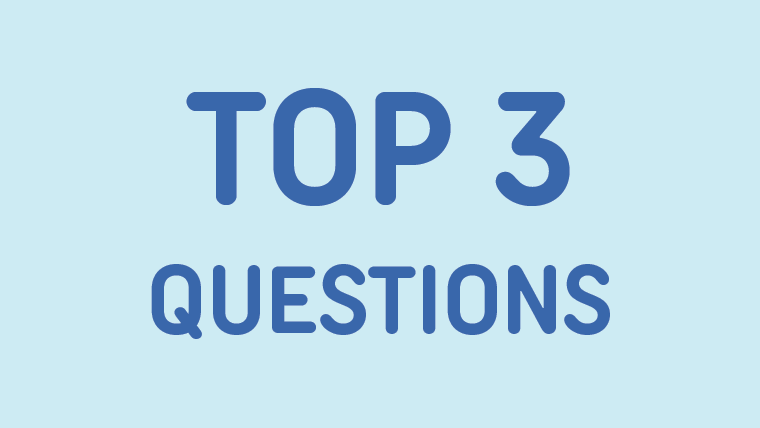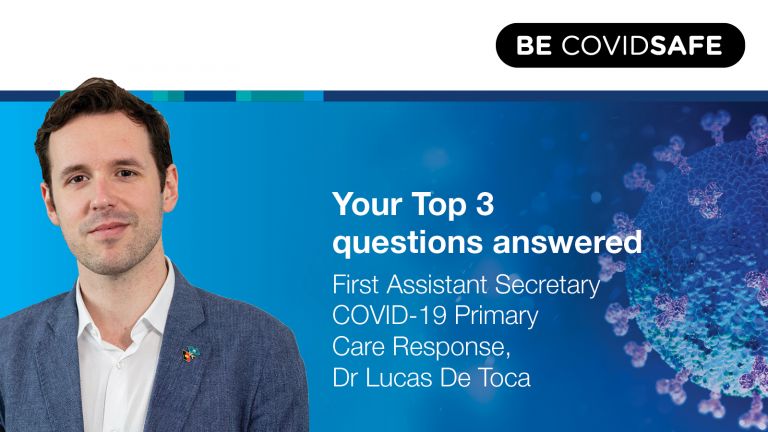
Good morning, I am Dr Lucas De Toca and I lead the rollout of the vaccine through GPs, pharmacies and Aboriginal health services for the Australian Government. Today, I am joined by Linda who is doing Auslan interpreting, as always. Thank you, Linda, and we are going to be answering some of your most asked questions on our social media channels, including what is Ronapreve and how it works to prevent COVID-19 or to treat COVID-19, talking about anxiety when kids are returning to school, and also talking about the lead time is for a third dose if you are severely immunocompromised. As usual, we are on the land of the Ngunnawal people, so Dhawra nhuna, dhawra Ngunawal. Yanggu gulanyin ngalawiri, dhunayi, Ngunawal dhawra. Wanggarralijinyin mariny balan bugarabang, and also extending that acknowledgement to the Traditional Owners of the lands where you may be watching from. Today's shout out is a massive shout out to everyone in Australia because we are passed 70% of the population 16 and over fully vaccinated. That's an amazing achievement, it has happened very quickly, and we want to thank you for it. It's really amazing that we have reached that milestone and it means that, as we are seeing in many states and territories, we're going back to as normal as possible and returning to the activites and social options that we had before the pandemic. So keep it up, keep coming up for your second dose, and the more vaccinated we are, the more protected we will be as a society. To celebrate that achievement, the Chief Nursing and Midwifery Officer, Professor Alison McMillan, is going to start baking treats to celebrate that we have reached that milestone. And we are encouraging everyone to join Alison, Professor McMillan, in that activity. So why don't you bake your favourite treat for yourself, for your friends and family, and you can share it on social media with the hashtag #BakeForTheSweetLife as we celebrate that we are reaching this first milestone on a fully vaccinated Australia. Keep it up and let's see how soon we can celebrate 80% fully vaccinated for 16 and over.
For today's first question, you probably will have heard about the Government's purchasing agreement for one of the latest COVID-19 treatments, Ronapreve. What is Ronapreve? How is it used to treat COVID-19?
Ronapreve is what we generally call an antibody cocktail or an antibody combination, so it is actually a drug that is administered intravenously, so an IV infusion has to be administered in a healthcare setting, it is not an oral medication, that contains two antibodies: Casirivimab and Imdevimab. A lot of complex names, of course. 'MAB' at the end of those names means monoclonal antibody, so that is a bit of a handy know to, if a drug ends in 'MAB', it means that it is a monoclonal antibody. What the drug does is it injects into the person antibodies that can recognize different parts of the SARS-CoV-2, the virus that causes COVID-19, and attaches to the virus in two different places, because there are two different antibodies, so you can target two different areas of the virus and that signals to your body, 'this is foreign, this is something you need to get rid of'. It reduces the infectivity if given early and, in some places, is being trialed to be used to treat contacts of positive cases and try to reduce their chances of a person getting infected. What these types of drugs do is essentially try to reproduce what would happen if you have already an immune response against the virus by providing you externally with the antibodies that can be used to treat the disease. However, these are not antibodies that are produced by your body so after a while, like any drug, they get eliminated from the organism and they don't cause any lasting immunity. So, still, the best thing you can do to make sure that you have the antibodies to protect yourself from COVID-19 is to get a vaccine so your body can actually generate its own antibodies to respond to the virus. Ronapreve, at the moment, is undergoing phase 3 clinical trials and we will keep monitoring how those go, and then the Therapeutic Goods Administration, our regulator for drugs in Australia, the TGA, will make a decision on whether that drug gets approved for use in our country and then it gets added to the toolbox of treatments that we have for COVID-19 including sotrovimab, that we spoke about in a different segment, or remdesivir. A bit like with other treatments like molnupiravir, what we are doing is purchasing in advance just in case and if they proves to be as effective and as safe as the early trials indicate and the TGA decides that we can use them in Australia, then we already have them purchased so we can make sure that people who need them, have them.
Today's second question is about returning to school.
We are seeing in many states and territories that after a very extended period of home schooling, face-to-face school learning is coming back and, understandably, many children are experiencing anxiety with the idea of going back to face-to-face learning after that time mostly at home, not dissimilar to the anxiety that many of us are feeling when we come back to the workplace after working from home and, of course, the parents that have concerns about their children going back to school. It's completely normal, and every child is different and parents have all of their very well-developed strategies to deal with these things. But I would recommend that you check out a very good resource on Beyond Blue's website called 'Managing Your Child's Transition Back to School.' I recommend a read, it's not a long article and it gives you a number of potentially useful tips. Again, it is not a rulebook and you know what works for your child, but it might give you ideas of how to shape or frame some of that thinking of very practical things like monitoring the requirements so you are up to speed with what is happening and what the requirements around your state and your school. Discuss things openly, matter-of-factly, having an open conversation with your child about what the situation is. Set up a routine. Routines, and that is not just for children, that is for everyone, routines can help settle some of those concerns and give us a sense of control. Use incentives and highlight the positives, you will be able to see your friends again, maybe organise play dates, if allowed according to public health restrictions, after school. Reinforce the positive elements of actually returning to school. Tell them that you are confident, instill that sense of confidence that this is a good thing that they can have and support them to make them feel better to be able to hang out with their friends face-to-face. Regularly check in, monitor how they are doing and keep having those conversations so if anything happens, you are maintaining across it. Pretty obvious things that I'm sure all of you are doing them and I'm not going to tell you how to suck eggs or deal with your kids, but there are some practical things that you may find useful. Ultimately, there are a lot of organisations that can help if you are worried about how your child is doing and you need a bit more help, which is completely fine and it is good that there is help out there. A few of those, the Kids Helpline has a phone number and online counselling for people aged 5 to 25 and you can find them on 1800 551 800. There is also Lifeline on 13 11 14. You can also call the Parentline in your state or territory for counselling and support. Their number varies from state and territory but you can google it and find what the relevant one is for your jurisdiction. You can also go to headspace.org.au to chat with someone online and also access many more resources. There is also SANE Australia for people living with a mental illness and their carers, and the phone number is 1800 187 263. And also you can reach out to a youth mental health service called Reach Out on reachout.com.
The final question for today is if I need a third dose because I am severely immunocompromised, what is the timing to get it?
My answers are always very long so I will just cut to the chase. The recommended interval for a third dose for immunocompromised people is between two and six months since you received your second dose. If you are in the list and the The Department of Health's website has a list of conditions and treatments that mean you may require a third dose in order to complete your primary course of vaccination for COVID-19. Talk to your health professional and if it has been at least two months since you had your second dose, organise an appointment for a third dose so you can complete your primary vaccination course. The current advice is that mRNA vaccines are preferred for that third dose, and that is either Pfizer (or Comirnaty) or Moderna (or Spikevax) vaccines. AstraZeneca can also be used for people who had a primary course with AstraZeneca and had no severe side effects. But at this stage for that third dose, the preferred vaccine is an mRNA one. As we said a couple of days ago, this is advice for a third dose for people who are severely immunocompromised, which is a small group of people. ATAGI, the Australian Technical Advisory Group on Immunisation, is still to provide advice on what, if any, the plans for an overall booster program for the general population and other at-risk groups will be. We will keep you informed as that changes.
That's all we have for today, thank you very much for joining us and submitting your questions. Thank you for your ongoing comments and thank you for staying COVIDSafe. Bake for Chief Nurse and Midwifery Officer Alison McMilan and make sure you use the hashtag #BakeForTheSweetLife. Thank you very much.
Top 3 questions
- What is Ronapreve and how can it help treat COVID-19?
- My child is feeling anxious after lockdown, how can I best support them as they return to school?
- If I need one, how long do I need to wait before I can receive a 3rd COVID-19 vaccine dose and where can I get one?







